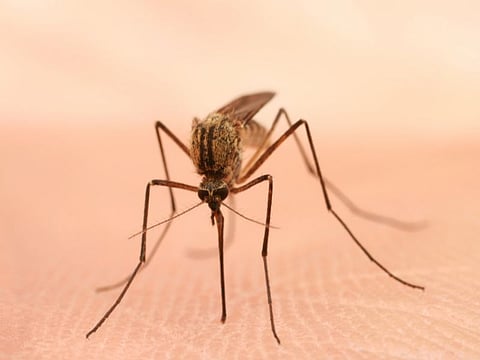FRIDAY, July 1, 2022 (HealthDay News) – When a mosquito bites and infects you with a virus like dengue or Zika, it also makes you smell good to other mosquitos, new research suggests.
That makes it more likely another one will bite, pick up the virus and carry it to the next victim.
“The virus can manipulate the hosts’ skin microbiome to attract more mosquitoes to spread faster!” said study co-author Penghua Wang, an immunologist at UConn Health in Farmington, Conn.
The findings could explain how mosquito-borne viruses persist for such a long time, researchers said.
Both dengue and Zika are spread by mosquitoes and are in the same viral family as yellow fever, Japanese encephalitis and West Nile.
Dengue affects 50 million people a year and kills 20,000, mostly children, according to the National Institutes of Health's National Institute for Allergy and Infectious Disease.
Zika can cause serious birth defects in the unborn children of infected pregnant women, though it rarely causes serious problems in adults.
To keep spreading, both viruses require ongoing infections in animal hosts. If all the mosquitoes died or all susceptible hosts cleared the virus, the viruses would disappear.
But there are always mosquitoes in tropical climates without killing frosts, and the viruses just need one to to bite a host to be able to spread.
Researchers suspected the viruses might be altering people’s scent in some way to attract mosquitos.
They found that mosquitos seemed to prefer mice infected with dengue more than healthy mice.
They then found and tested several molecules that were more common on infected animals. They applied these to both clean mice and the hands of human volunteers.
One molecule, acetophenone, was especially attractive to mosquitoes.
Similarly, skin odorants from people with dengue found more acetophenone and that these patients also were more attractive to mosquitoes.
Acetophenone is made by some Bacillus bacteria that grow on human and mouse skin. An antimicrobial peptide that skin produces typically keeps it under control, but infected mice don’t produce as much of it when they’re infected with dengue or Zika, prompting the bacteria to grow faster.
Researchers also tested a potential preventative — a vitamin A derivative called isotretinoin that increases production of the skin’s protective antimicrobial peptide. Mice treated with isotretinoin turned out to be less attractive to mosquitoes.
The next step is to analyze more human patients with dengue and Zika, Wang said. The goal will be to see if the skin odor-microbiome connection holds up in real world conditions. Researchers also want to see if isotretinoin reduces acetophenone production in sick people as well as it does in sick mice.
The findings were published June 30 in the journal Cell.
More information
The National Library of Medicine has more about mosquito bites.
SOURCE: University of Connecticut, news release, June 30, 2022


